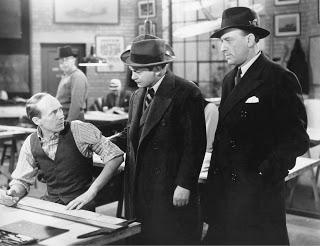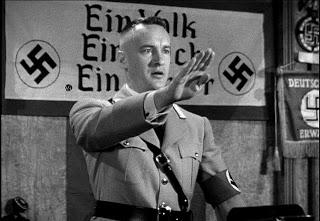
"Force is the only language you will understand! And we'll speak to you in your own language soon enough!"
Hollywood tiptoed around Nazi Germany for years, reluctant to court controversy and alienate foreign markets. Anatole Litvak finally broke the silence with Confessions of a Nazi Spy (1939). While the film's message plays stridently today, it's still an engaging, passionate drama.Dr. Karl Kassel (Paul Lukas) helps organize the German-American Bund, a fascist group pairing German immigrants and Nazi spies. FBI Agent Renard (Edward G. Robinson) works to unravel their network, targeting Kurt Schneider (Francis Lederer), who's infiltrated an American military installation. Renard's investigation leads him to Kassel and other leaders, while Berlin works to save or destroy their agents.
Confessions of a Nazi Spy is a propagandized blend of fact and feverish antifascism. The real German-American Bund was rather ineffectual, embarrassing even Goebbels as a boorish liability. Confessions casts them as the vanguard of Nazi invasion, spreading propaganda couched in Americanism as Hitler subdues Europe. Litvak and writers Milton Krims and John Wexley conflate America First isolationists with nascent Hitlerism, with Henry O'Neill's attorney sternly announcing the necessity of American intervention.
Much of Confessions is a straightforward message film, Litvak pairing pronouncements of Nazi terror with montages of marching stormtroopers and propaganda flooding America. We see rallies where Bundists beat American Legionnaires, camps of Nazified children and menacing Gestapo men dragging uncooperative agents to Germany. Litvak also takes care to highlight anti-Nazi refugees, like a shipboard matron who unknowingly denounces Hitler to spy Hilde (Dorothy Tree).

Audiences not receptive to interventionist harangues can enjoy the well-constructed spy plot, with Renard methodically uncovering Kassel's spies. He flatters Schneider into betraying his secrets, using blackmail and persuasion to nab his colleagues. The Nazis use American rights as a shield while denouncing democracy; Schneider has an American wife and others are similarly integrated. Renard rouses complacent superiors (and viewers) into action, informing them that peace is an illusion with Hitler fighting a one-sided war.
Edward G. Robinson's stern G-Man provides a firm anchor, allowing his costars to shine. Paul Lukas gives a layered villain turn, alternately hateful, conflicted and pitiable. George Sanders and Dorothy Tree provide fierce adversaries, with Francis Lederer, Sig Ruman and Henry Victor in supporting turns. Many supporting players were German or Austrian émigrés, investing their performances with extra urgency.
Confessions of a Nazi Spy can't possibly seem as daring, inflammatory or urgent as it did eighty years ago. Even audiences who don't need persuasion of Hitler's evil can appreciate a well-crafted show like this.

